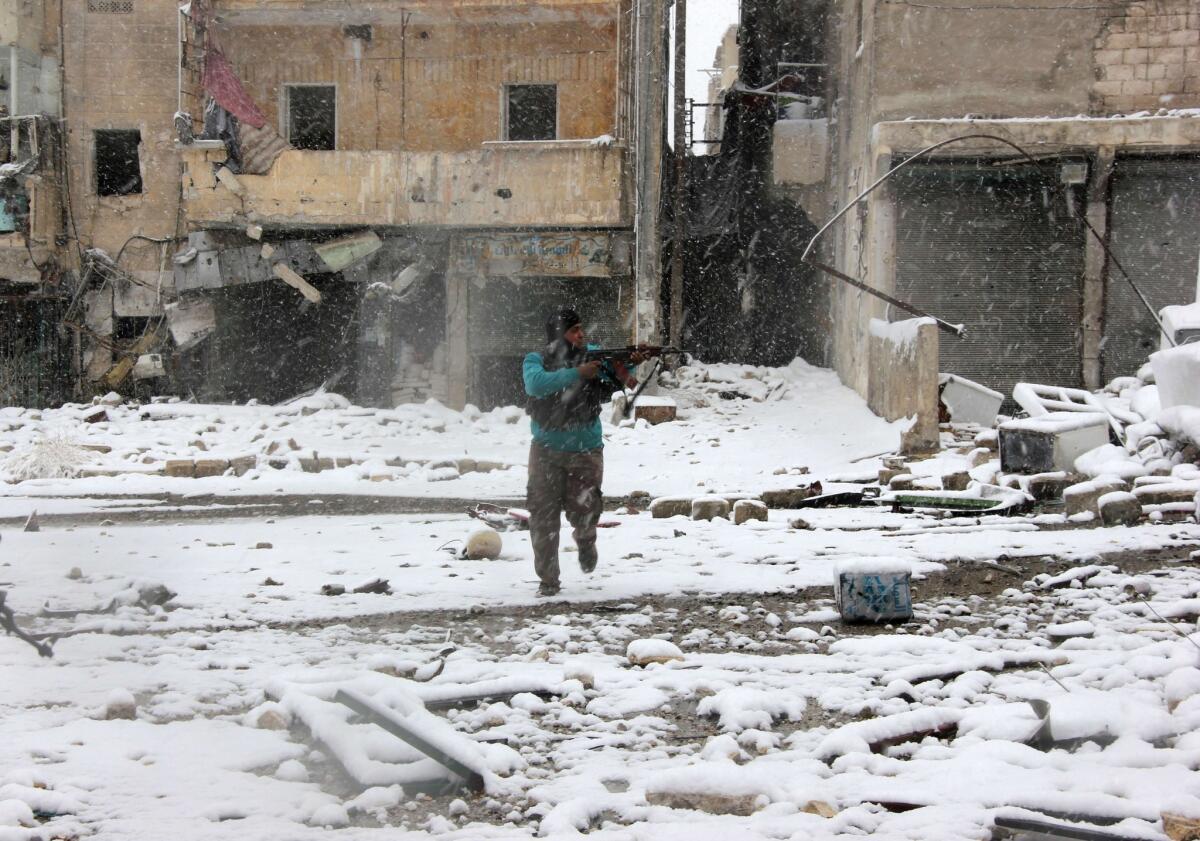U.S., concerned about militants, suspends some Syrian rebel aid

- Share via
BEIRUT -- The United States has suspended delivery of non-lethal aid to the armed opposition in northern Syria following reports that Islamist militias had seized U.S.-provided equipment inside the country, the American Embassy in Turkey confirmed Wednesday.
The move appears to be the latest blow to the Western-backed Free Syrian Army, which has been increasingly overshadowed on the battlefield by hard-line Islamist insurgents, including several groups linked to Al Qaeda.
The White House strategy in Syria has been based on supporting so-called moderate elements in the armed opposition fighting to oust the government of President Bashar Assad.
But reports from inside Syria indicate that Al Qaeda groups and other militant Islamist militias -- some supported by Saudi Arabia, a close U.S. ally -- are emerging as the most powerful factions in the deeply fractured opposition ranks.
The ascendancy of hard-line Sunni Islamist militias has caused deep concern in Washington about the direction of U.S. policy in Syria, which is engulfed in the third year of a withering conflict that has heightened instability and tension throughout the Middle East. Some rebel militias have an openly sectarian and non-democratic agenda for the nation’s future.
T.J. Grubisha, a spokesman for the U.S. Embassy in Ankara, confirmed the suspension of non-lethal aid Wednesday in a telephone interview. But the spokesman stressed that the move did not affect ongoing shipments into northern Syria of humanitarian aid, which is distributed via international relief organizations.
Turkey, which shares a more than 500-mile land border with Syria, is a key conduit for all manner of aid and equipment being shipped into rebel-held zones of northern Syria. Aid organizations also have expressed concerns about armed groups hijacking aid trucks and equipment inside Syria and kidnapping drivers and humanitarian staffers.
The United States has provided more than $115 million in so-called non-lethal support to the Syrian opposition. Though the embassy spokesman would not provide details on the type of aid suspended, the non-lethal supplies include items such as hand-held two-way radios and other communications equipment, medical kits, laptops, trucks and satellite-access gear.
Prompting the suspension were reports last week that armed Islamist opposition fighters, possibly linked to Al Qaeda, had seized opposition supply depots on the Syrian side of the border. The seizure appeared to be yet another indication of the relative weakness of the Free Syrian Army, which has long been a loose umbrella franchise of sundry rebel militias largely lacking a central command structure.
U.S. officials have previously expressed concern that equipment meant for the Western-backed forces could fall into the hands of Al Qaeda militias or other militant factions. It was not clear, however, if any U.S.-provided stock had been seized.
U.S. authorities are in contact with Gen. Salim Idriss, the nominal head of the Free Syrian Army, to determine the status of goods destined for his group, the embassy spokesman said.
“We’re working with Gen. Idriss and his staff to inventory the status of equipment and supplies,” Grubisha said.
[Updated at 2:25 p.m. on Dec. 11: In Washington, State Department officials said they had no information indicating that weapons or other lethal equipment belonging to the Free Syrian Army were seized. “Our understanding at this point was that it was nonlethal,” State Department spokeswoman Jen Psaki said.
Psaki said U.S. officials hadn’t decided how long the suspension of nonlethal assistance to the northern rebels would last, but said that aid would continue to be sent into Syria “through other neighboring countries to other parts of Syria.”
Experts say the relative ease with which Islamists appears to have seized the Free Syrian Army’s depots underscores the group’s weaknesses, but U.S. officials say they continue to view Idriss’ forces as their main partner among the armed Syrian opposition.]
A spokesman for the Islamic Front, a relatively new alliance of six rebel groups inside Syria, said via Skype that its forces had intervened to protect the equipment after receiving a call for help on Friday from Idriss’ offices.
However, the Islamic Front spokesman, who gave his name as Islam Alloush, said representatives of the alliance arrived on the scene to find that the stores “had been completely emptied by an unknown group.”
[Updated at 5:02 p.m. on Dec. 11: Several reports identified the group that seized the stocks as an Al Qaeda-linked rebel faction.]
Meanwhile, Turkish authorities said they had closed the major Bab al-Hawa border crossing to Syria following the seizure by Islamist rebels of the gate on the Syrian side. The crossing is a major conduit for aid and goods headed for Syria.
ALSO:
Family, dignitaries pay tribute as Nelson Mandela lies in state
In pioneering experiment, Uruguay nationalizes marijuana trade
Ukraine protesters clash with police, demand president’s resignation
Twitter: @mcdneville
Times staff writer McDonnell reported from Beirut and special correspondent Bulos from Dubai, United Arab Emirates. Times staff writer Shashank Bengali in Washington contributed to this report.
More to Read
Sign up for Essential California
The most important California stories and recommendations in your inbox every morning.
You may occasionally receive promotional content from the Los Angeles Times.











